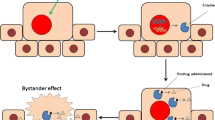Abstract
Delivery and expression of the herpes simplex virus thymidine kinase (HSVtk) gene in combination with the prodrug ganciclovir is currently being evaluated for the treatment of many types of cancer. After initial phosphorylation by HSVtk, cellular kinases generate the toxic triphosphate form of ganciclovir (GCV). To further define the role of GCV metabolism in cells expressing HSVtk, two human tumor cell lines, UMSCC29 and T98G, were transduced with HSVtk and screened for insertion of one or two copies of the viral transgene by Southern blot analysis. Both the relative capacities for incorporating labeled GCV and the levels of GCV metabolites were determined for each of the parental cell lines and their derivatives containing either one or two copies of the HSVtk gene. The efficiency of GCV killing and the magnitude of the bystander effect were compared for the single- and double-copy HSVtk cell lines. Consistently, cells that expressed two copies of HSVtk metabolized GCV more efficiently, were more sensitive to GCV, and demonstrated improved bystander killing relative to single-copy HSVtk cells. The implications of these results for future and current therapies employing HSVtk and GCV are discussed.
Similar content being viewed by others
Author information
Authors and Affiliations
Corresponding author
Rights and permissions
About this article
Cite this article
Kim, Y., Bi, W., Feliciano, E. et al. Ganciclovir-mediated cell killing and bystander effect is enhanced in cells with two copies of the herpes simplex virus thymidine kinase gene. Cancer Gene Ther 7, 240–246 (2000). https://doi.org/10.1038/sj.cgt.7700113
Received:
Accepted:
Published:
Issue Date:
DOI: https://doi.org/10.1038/sj.cgt.7700113
- Springer Nature America, Inc.
Keywords
This article is cited by
-
Neural stem cell-based dual suicide gene delivery for metastatic brain tumors
Cancer Gene Therapy (2012)
-
Adeno-associated virus type 2 infection activates caspase dependent and independent apoptosis in multiple breast cancer lines but not in normal mammary epithelial cells
Molecular Cancer (2011)
-
A guanylate kinase/HSV-1 thymidine kinase fusion protein enhances prodrug-mediated cell killing
Gene Therapy (2006)
-
Cancer gene therapy: Combination with radiation therapy and the role of bystander cell killing in the anti-tumor effect
Pathology & Oncology Research (2006)
-
Antitumor effect of secreted Flt3-ligand can act at distant tumor sites in a murine model of head and neck cancer
Cancer Gene Therapy (2003)



